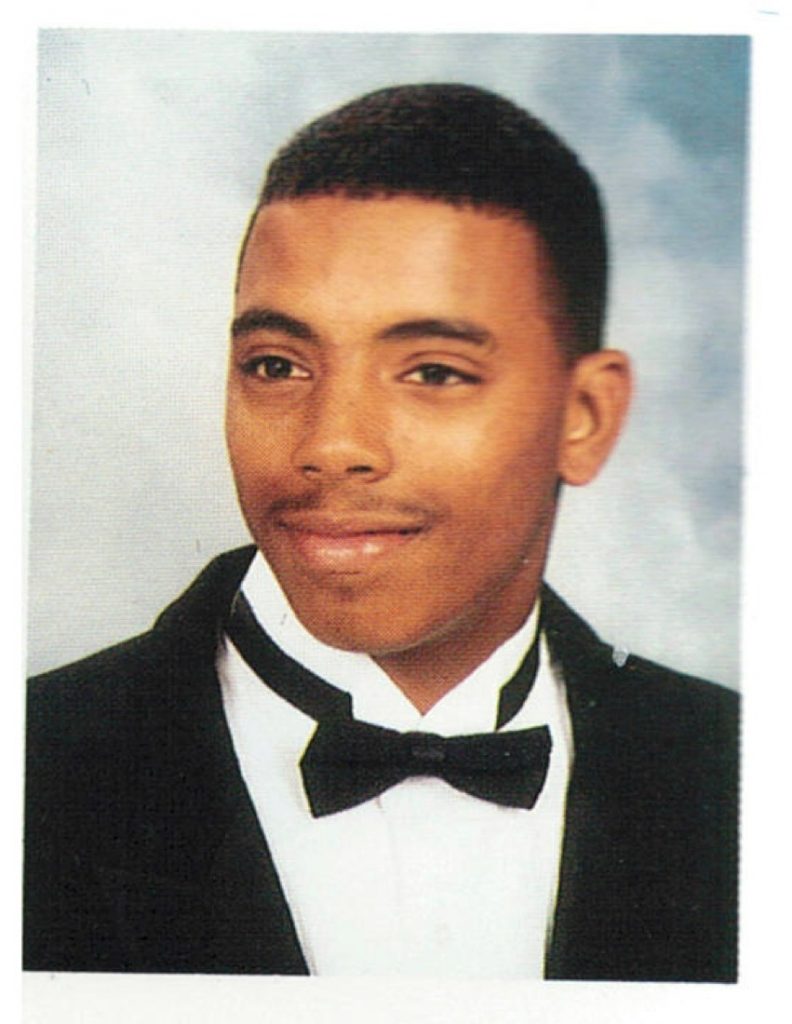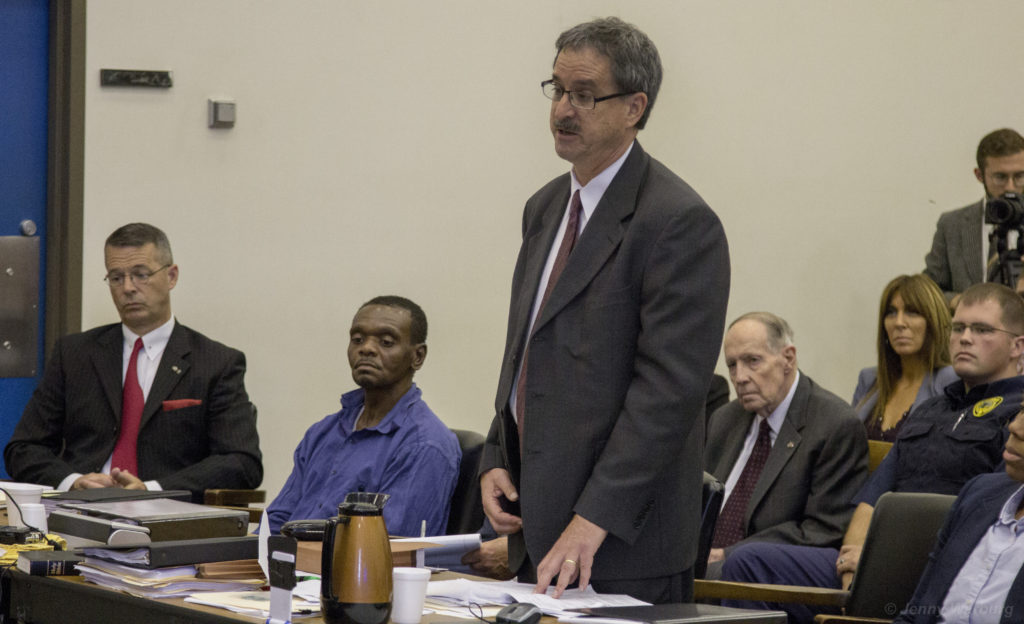CDPL attorneys Elizabeth Hambourger and Vernetta Alston were part of the team that won a life sentence for Nathan Holden in Wake County on March 3. The jury rejected both the state’s claim that the murder was premeditated and that the death penalty was warranted. It was the eighth capital trial in a row in which a Wake County jury chose life without parole over a death sentence. Here you can watch Elizabeth Hambourger give her moving closing argument, in which she asked the jury to save her client’s life.
After 8th failed capital trial, juries and public safety officials denounce death penalty
For immediate release: March 6, 2017
For More Information Contact: Gerald Galloway, 910-639-0857
Wake jury chooses life without parole instead of death for seventh time in a row
Raleigh, NC – Last Friday, for the eighth time in a row, a Wake County jury rejected the death penalty. At the end of an eight-week trial for his life, Nathan Holden received a sentence of life with no possibility of parole.
It has been nearly a decade since Wake has sent anyone to death row. Now, public safety officials are coming forward to say the death penalty is a waste of resources in the fight against crime. In a new video from the Center for Death Penalty Litigation, a longtime North Carolina police chief and a high-ranking retired prison official who helped manage more than a dozen executions say they have serious concerns about the death penalty’s errors, ineffectiveness, and high cost.
“We spend so much time and money seeking death sentences in a tiny percentage of cases, and we have to ask ourselves, what are we getting for that investment?” said Gerald Galloway, a retired Southern Pines police chief who is now among the leaders of Public Safety Officials on the Death Penalty, a group of law enforcement and corrections officials from across the U.S. who are concerned about the fairness and efficacy of the death penalty.
“We have a broken system where innocent people are sometimes sentenced to death,” Galloway said. “We promise victims’ families ‘closure,’ and then the convicted sit on death row for decades, if they are executed at all. It only makes sense that juries are rejecting the death penalty. It no longer serves any useful public safety purpose.”
Seeking the death penalty at trial is a costly gamble for prosecutors. When defendants face the death penalty, they are entitled to two attorneys. A separate sentencing phase of the trial is required. And juries in capital cases must be “death qualified,” a process that removes all jurors who oppose the death penalty.
In an urban county like Wake, where people are increasingly skeptical of the death penalty, that process can extend the trial by weeks. In Holden’s case, it took more than five weeks to seat a jury.
According to N.C. Indigent Defense Services, the average capital case costs about four times as much as a non-capital first-degree murder case.
It has been more than a decade since North Carolina executed a prisoner. In the meantime, many who formerly supported the punishment have begun to speak out against it. In May 2016, former N.C. Supreme Court Chief Justice I. Beverly Lake Jr., who voted to affirm 185 death sentences, said he now believes the death penalty is unconstitutional.
Jennie Lancaster, a former Chief Deputy Secretary at the N.C. Department of Corrections, was part of a team managing 14 executions in North Carolina. She has consulted with N.C. Conservatives Concerned about the Death Penalty, and says she does not believe the death penalty improves public safety. She says executions are hard on prison staff and that even the most violent offenders can be managed within prison walls.
“It is a fallacy to believe that the inmates who are on death row have committed the very worst crimes in some sort of hierarchy,” she says in the new video. “We have hundreds and thousands of inmates who have done the same thing. We manage them every day.”
Learn more at cdpl.org/safety.
Public Safety Experts Condemn the Death Penalty
Public safety officials were once hesitant to speak out against the death penalty. But today — after 150 innocent people have been exonerated in from death rows across the country — many are beginning to voice serious concerns about the death penalty’s mistakes, waste, and unfairness.
In this video from the Center for Death Penalty Litigation, Gerald Galloway, a longtime police chief from Southern Pines, N.C., and Jennie Lancaster, a former warden and chief deputy secretary with the N.C. Department of Corrections who helped manage 14 executions, add their voices to the growing chorus of people who doubt the death penalty’s ability to keep us safe.
More resources:
- Public Safety Officials on the Death Penalty
- N.C. Coalition for Alternatives to the Death Penalty: Executions Fail to Deter Crime
- Former NC Supreme Court Chief Justice I. Beverly Lake: The Death Penalty is Unfair and Unconstitutional
- N.C. Conservatives Concerned About the Death Penalty
- Police Chiefs: Death Penalty Not an Important Tool
Saving the Lives of our Most Vulnerable Clients
Clients with intellectual disabilities are some of the most vulnerable people we represent. On April 13 in Raleigh, CDPL will host a one-day continuing legal education seminar on representing clients with intellectual disabilities in capital cases — and saving their lives. For attorneys and mitigation investigators appointed to represent indigent capital defendants. Enrollment is limited and preference is given to first-time attendees. Cancellations after April 6 are non-refundable.
Learn more about intellectual disabilities and the death penalty in North Carolina at NCDeathPenalty.org.
Full agenda:
 The Center for Death Penalty Litigation Presents
The Center for Death Penalty Litigation Presents
WORKING WITH OUR MOST VULNERABLE CLIENTS AND SAVING THEIR LIVES:
THE DEFENSE OF CLIENTS WITH INTELLECTUAL DISABILITIES IN CAPITAL CASES
North Carolina Advocates for Justice Headquarters, 1312 Annapolis Drive, Raleigh
April 13, 2017
8:45 Registration (coffee provided)
9:10 Welcome
9:15 Overview of Intellectual Disabilities Law — Gretchen M. Engel
From Atkins v. Virginia to Hall v. Florida and Brumfield v. Louisiana, as well as N.C. Gen. Stat. §15A-2005 and its 2015 revisions.
10:00 Identifying Persons with Intellectual Disabilities — J. Gregory Olley, Ph.D.
Explanation of the diagnostic criteria for intellectual disability and a discussion of common pitfalls that cause defense teams to fail to recognize their clients’ deficits.
11:00 Break
11:15 Ethical Challenges of Representing Intellectually Disabled Clients — Hon. Mary Ann Tally & J. Gregory Olley, Ph.D.
How to ensure that your intellectually disabled client makes knowing and intelligent decisions about plea bargains and at trial.
12:30 Lunch (on your own)
1:45 Investigating Adaptive Functioning — Odalys Rojas
Document collection and witness interviews needed to identify and prove deficits in adaptive functioning.
2:45 Presenting a Compelling Case of Intellectual Disability — Joseph E. Zeszotarski
How to persuade the prosecutor, judge, or jury of your client’s intellectual disability.
3:30 Adjourn
Total CLE hours: 4.75, including 1.25 hours of ethics
Register here. With questions, contact Barrie Wallace: barrie@cdpl.org.
CDPL client resentenced to life due to racial bias in court
 Last week, a CDPL client who spent nearly 20 years on death row was re-sentenced to life in prison without parole. This was a sane resolution to a senseless and much-regretted crime committed by a deeply troubled teenager.
Last week, a CDPL client who spent nearly 20 years on death row was re-sentenced to life in prison without parole. This was a sane resolution to a senseless and much-regretted crime committed by a deeply troubled teenager.
Phillip Davis was re-sentenced with the full of support Buncombe County District Attorney Todd Williams, who acknowledged unfairness in Davis’ case. “Our system has built-in checks on abuses such as discrimination and prosecutorial misconduct. When the system is not allowed to work as it’s naturally intended to, that’s when you have a problem,” Williams told the Asheville Citizen Times.
Davis was represented by Shelagh Kenney, CDPL’s Director of Post-Conviction Litigation, and Mark Kleinschmidt.
Davis was among the more than three-quarters of N.C. death row inmates who were sentenced to death before 2001, when vastly different laws led to dozens of people being sent to death row each year. Now, with executions on hold for a decade and juries imposing an average of only one death sentence a year, they languish on death row year after year.
Settling these old cases for sentences of life imprisonment with no possibility of parole would end costly appeals and ensure that defendants are never released from prison — while giving a punishment that is far more fitting with North Carolina’s current standards of justice. Once in general population, inmates cost less to house and can get jobs that allow them to contribute to society.
In Davis’ case, he was just four months past the age that would now make him ineligible for the death penalty when, as a high school senior, he killed his cousin, Caroline Miller, and his aunt, Joyce Miller, after an argument. Davis was living with them because his mother — a lifelong drug addict who had subjected him to a traumatic childhood — was in prison.
Davis, whose IQ puts him in the range of borderline intellectual functioning, immediately accepted responsibility for his crimes and expressed deep remorse. He voiced his sorrow and regret for his actions again in court last week, his voice choked with emotion: “To family members and anyone who knew Joyce and Caroline, they were two very special people who were loved by a lot of people including myself. I regret everything that happened and it’s something I’ll regret for the rest of my life.”
The prosecutor who agreed to his new sentence acknowledged that race wrongly played a role in selecting the all-white jury that sentenced Davis to death in 1997. It is illegal to strike jurors based on race, and in 2016, the U.S. Supreme Court confirmed that in the strongest terms ever.
The problem was compounded when prosecutors in Davis’ case took the unusual step of shredding many of their notes from jury selection, making it impossible to examine them for evidence of racial bias.
The victims’ family members said they were satisfied with the life sentence. They have worked over many years to rebuild their relationship with Davis, and his new sentence allows the family’s healing to continue.
It’s a resolution that makes sense for all involved.
CDPL visionary Ken Rose retires after 35 years on death penalty front lines

©Jenny Warburg
Ken retired this month from CDPL, where he had worked since 1996 and earned his reputation as one of North Carolina’s most respected and visionary death penalty defense attorneys. During his 35-year career in North Carolina, Ken never lost the idealism or the passion that has driven him since his earliest days. He never stopped being surprised — and outraged — at injustice. He never stopped plotting to outwit the machinery of death. And he never stopped representing every client as if both of their lives depended on it.
N.C. death penalty fades in 2016, but oversized death row remains
For Immediate Release: December 21, 2016
For More Information Contact: Gretchen Engel, 919-956-9545 or Kristin Collins, 919-791-7976
State houses nation’s 6th largest death row, despite no executions and few new death sentences
Durham, NC — In 2016, North Carolina passed the decade mark without an execution, tried just five people capitally in all 100 counties, and of those five, sent only one person to death row. As another year ends, North Carolina continues to reflect national trends, which clearly show the death penalty on the decline.
Across the country, new death sentences in 2016 were at their lowest point in the modern era of the death penalty, which began in 1972. Only 20 people were executed in the U.S. this year, the fewest in 25 years. And a September poll from the Pew Research Center showed that in 2016, for the first time in four decades, a majority of Americans no longer support the death penalty. (More national statistics at DeathPenaltyInfo.org.)
“Look at Wake County, which used to send people to death row almost every year, but hasn’t had a new death sentence in almost a decade. This year, in the sixth case in a row, a Wake County jury chose a sentence of life without parole over the death penalty,” said Gretchen M. Engel, executive director of the Center for Death Penalty Litigation. “Society’s beliefs have shifted, and in the overwhelming majority of cases, people no longer think it’s appropriate.”
Over the past five years, an average of fewer than two people per year have been sent to death row in North Carolina, compared with 20 to 30 people per year in the 1990s. There were no new death sentences in 2012 and 2015. Yet, despite the death penalty’s fade, North Carolina continues to cling to one relic of the death penalty’s past.
With 150 men and women awaiting execution, North Carolina has the sixth largest death row in the nation. Three-quarters of N.C. death row inmates were convicted and sentenced at least 15 years ago, at a time when laws governing the death penalty were starkly different.
North Carolina now must maintain a death row where people live for decades. Two inmates died of natural causes this year, bringing the total to six in past five years. Almost half of N.C.’s death row inmates are now 50 or older, and 21 are 60 or older.
“Our death row is becoming a costly warehouse for the elderly,” Engel said. “And most of these people, if they had been tried under today’s laws, would never have been sentenced to death in the first place.”
In 2014, the exoneration of Henry McCollum, N.C.’s longest serving death row inmate showed just how unreliable decades-old convictions can be. Both McCollum and his brother, Leon Brown, were sentenced to death in 1983 based on false confessions that were written for them by law enforcement. McCollum and Brown did not benefit from modern laws designed to prevent false confessions, which now require all murder interrogations and confessions to be recorded.
One hundred twelve of North Carolina’s death row inmates were tried during an era when North Carolina was the only state in the nation that forced prosecutors to seek death sentences in every case of first-degree murder with an aggravating factor, regardless of other factors that might have called for mercy. Prosecutors could not agree to a sentence other than death even if, for example, the defendant played a minor role in the crime or was seriously mentally ill. This requirement led to unprecedented numbers of capital prosecutions and gave North Carolina one of the highest death sentencing rates in the nation during the 1990s. As soon as the requirement was dropped in 2001, death sentences plummeted.
The majority of death row inmates did not have the benefit of key reforms including the creation of a state agency to oversee indigent defense; a law granting defendants access to all the evidence in the prosecutor’s file, including evidence pointing to innocence; a bar on the execution of people with intellectual disabilities; and new strict guidelines for suspect lineups designed to prevent mistaken eyewitness identification.
In light of the unfairness in the system, even the staunchest defenders of the death penalty are now beginning to rethink their support for the punishment. As the former Republican Chief Justice of the N.C. Supreme Court, I. Beverly Lake, Jr. voted to affirm 185 death sentences, and 120 of those people remain on death row today. This May, he said he now believes the death penalty is unfair and unconstitutional.
Lake wrote in an op ed: “After spending years trying to instill confidence in the criminal justice system, I’ve come to realize that there are certain adverse economic conditions that have made the system fundamentally unfair for some defendants.”
###
N.C. death penalty fades in 2016
 In 2016, North Carolina passed the decade mark without an execution, tried just five people capitally in all 100 counties, and of those five, sent only one person to death row. As another year ends, North Carolina continues to reflect national trends, which clearly show the death penalty on the decline. Yet, despite the death penalty’s fade, North Carolina continues to cling to one relic of the death penalty’s past. With 150 men and women awaiting execution, North Carolina has the sixth largest death row in the nation — and most were sentenced more than 15 years ago.
In 2016, North Carolina passed the decade mark without an execution, tried just five people capitally in all 100 counties, and of those five, sent only one person to death row. As another year ends, North Carolina continues to reflect national trends, which clearly show the death penalty on the decline. Yet, despite the death penalty’s fade, North Carolina continues to cling to one relic of the death penalty’s past. With 150 men and women awaiting execution, North Carolina has the sixth largest death row in the nation — and most were sentenced more than 15 years ago.
Lisa Dubs receives CDPL’s 2016 Osborn Award
On Oct. 6, CDPL honored Lisa Andrew Dubs, the winner of the 2016 J. Kirk Osborn Award for her lifelong commitment to representing defendants facing the death penalty. Lisa’s deep care and concern for her clients has made her one of North Carolina’s most successful capital defense attorneys. [Read more here about the award, and about Lisa’s outstanding career.]
The award reception was held at the beautiful Durham home of Don Beskind and Wendy Robineau. A big thank you to our hosts, and to all our sponsors who made this inspiring night possible. Special thanks to our photographer, Emily Baxter of We Are All Criminals.
N.C. passes a decade with no executions
 CDPL is marking an important anniversary: A decade without an execution. On Aug. 18, 2006, Samuel Flippen was the last person to be executed at Central Prison. At the time, North Carolina had one of the most active death chambers in the nation. Since that day, we have become the only Southern state to end executions. However, we can never take for granted that this respite will continue. CDPL works every day to make sure North Carolina’s death chamber remains empty. Read more on NCDealthPenalty.org about why it’s time to end the death penalty for good.
CDPL is marking an important anniversary: A decade without an execution. On Aug. 18, 2006, Samuel Flippen was the last person to be executed at Central Prison. At the time, North Carolina had one of the most active death chambers in the nation. Since that day, we have become the only Southern state to end executions. However, we can never take for granted that this respite will continue. CDPL works every day to make sure North Carolina’s death chamber remains empty. Read more on NCDealthPenalty.org about why it’s time to end the death penalty for good.
